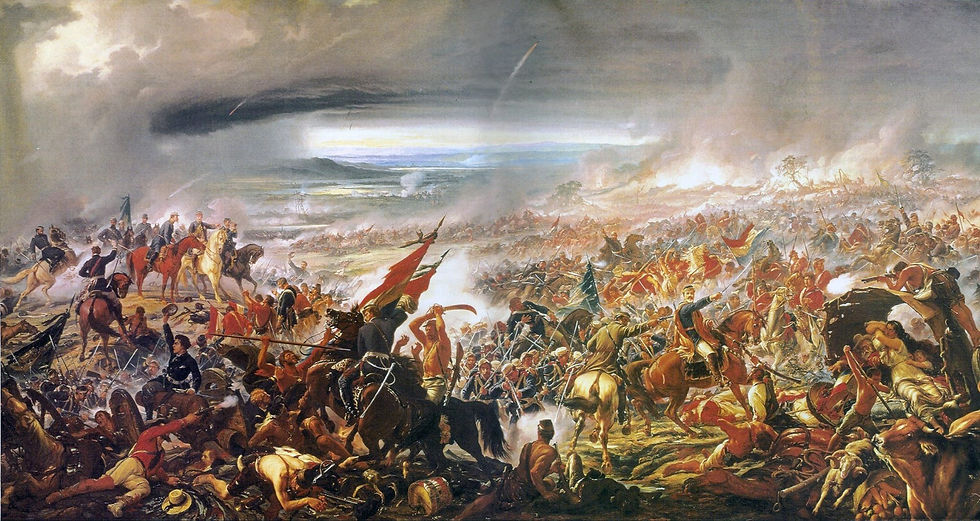Suppressed Emotions
- Isaac Gonzalez
- Oct 12, 2014
- 3 min read

In the Iliad, there are many instances where “immortals” cast a great influence on many characters. In one event, it is revealed in Achilles confrontation with Agamemnon, “only Achilles saw her (Athena) none of the other fighters [I.233]”. There is a vast possibility that these are all cunning emotions that the warriors dealt with and not actual “gods” as we are lead to believe. Athena during this confrontation tells Achilles “come to check your rage only if you will yield [I.142-143]”. By following the orders, does Achilles stop and reflect, thus in the event does Athena appear to act as his inner conscious allowing him to stop before acting and think of the consequences his actions may cause. Furthermore, at this scene, there is an attempt by Agamemnon to retain Achilles from attacking him. However, Achilles refuses to be retained by someone he views as inferior, it is not until “Athena” whom represents his emotions and inner conscious that he stops himself from attacking Agamemnon. This is because while he views himself as higher than Agamemnon, his emotions shadow him and his conscience retains him from the imprudent decision of killing Agamemnon where he stands. This is also how as depicted in the second image, Athena defeats Ares. Being tacticle and using your wisdom in war will yield more victories than being blinded by rage as were soldeirs as Ares entered the battle. These two emotions once again are never ending strategies used in war and are gifts of cunning excellence in a person and not a god itself.

In Greek Mythology, Athena is the goddess of war, while Aphrodite is the goddess of love. When this is applied to the way that both portrayed in The Iliad, it is evident they’re emotions. While both are in the battlefronts, Aphrodite becomes injured and must ascend back into Olympus. While about to mount the Chariot, she is told to refrain from the front lines or she’ll die. When this is viewed as a enriched panoramic representation, it is clear that this scene is a battle between Athena and Aphrodite, between love and war. The phrase Aphrodite is told, displays how love dies at the front lines of war as solders dwell in a thirst for blood and have no intentions of turning back rushing with adrenaline while those in the back lines can still be swayed to feel epiphany towards the enemy and turn back in the name of love. In the heat of the war, Aphrodite retreats injured and the war heightens as solders die by the hands of their enemies fueled by their own lust of blood and war, as like Aphrodite love retreats from the war. The war between Aphrodite and Athena, is one that isn't new to the world and has been ongoing for centuries, it was The combat of Mars and Minverva, Jacques-Louis David(1771) no different for the Greeks. There is the two conflicting emotions between the crowd as seen in both the battle that wages in The Iliad and in the pictures.
In book 5, Diomedes even attacks Aphrodite directly injuring her and attempts to injure Apollo right after he kills several warriors in the war. This is simply Diomedes injuring the enemies love and kind side by killing many of the enemies in cold blood, as well as coming close to breaking all hopes to “enlighten” a compromise and bringing people the harsh truth of war. Similarly, Pandarus shoots the arrow convinced by “Athena” however it is flicked not by the goddess, but his lust of war. Pandarus knows that when killing the leader of the war, he will simply end it, however he seeks bloodshed and havoc, not only does he seek these things, but most importantly the sweet riches of tîmê and Kleos.
God’s represent the Greeks emotions all throughout The Iliad, the characters are not constrained by mystical gods, but their own emotions. Though it may seem like an unusual concept to praise an emotion as a figure, we still celebrate a similar way for “love” by portraying it as cupid especially during Valentine’s Day. "Intellect is confined within our prejudice sentiment"
Works Cited
13insane37. Peace Not War. Digital image. Deviant Art. N.p., n.d. Web. 12 Oct. 2015. <http://13insane37.deviantart.com/art/Peace-Not-War-289593072>.
David, Jacques Louis. The Combat of Mars and Minverva. Digital image.Jaques-Louis David: The Complete Works. N.p., n.d. Web. 12 Oct. 2015. <http://www.jacqueslouisdavid.org/The-Combat-of-Mars-and-Minerva-1771.html>.
Homer, and Robert Fitzgerald. The Iliad. Garden City, NY: Anchor, 1974. N. pag. Print.

Comments